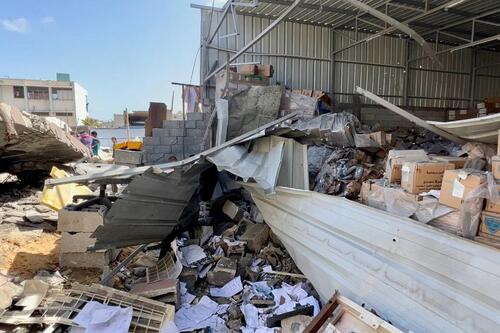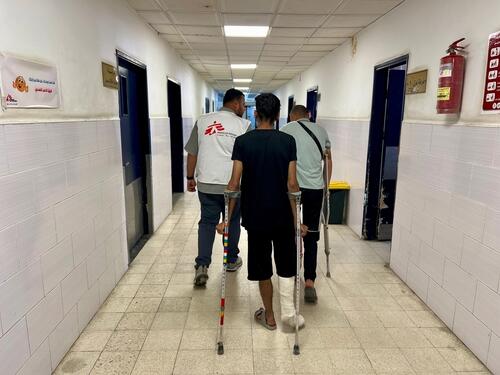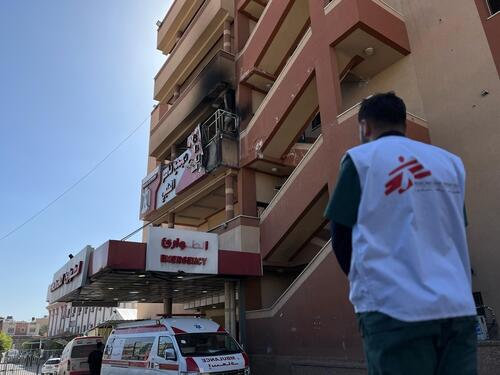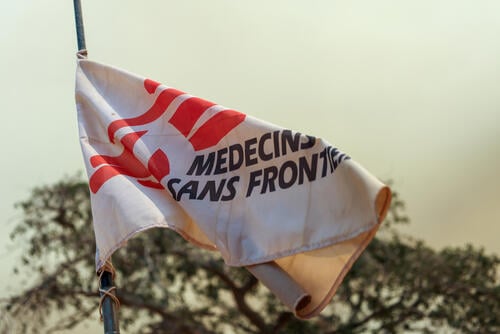Note: a small correction to the source and number of functional hospital beds in Gaza was made on 6 June.
- While Israeli authorities let an insufficient amount of aid into Gaza to pretend the siege is over, ground operations continue to damage and put medical facilities out of service.
- On 19 May, a strike hit Nasser hospital's compound, damaging the Ministry of Health's pharmacy store at a time when supplies are already running low.
- Attacks on medical care must stop now and aid must enter Gaza in sufficient quantities.
Jerusalem – The insufficient amount of aid being allowed into the Gaza Strip, Palestine, is merely a smokescreen to pretend the siege is over. Meanwhile, at least 20 medical facilities in Gaza have been damaged, or forced partially or completely out of service, in the past week by advancing Israeli ground operations, intensified airstrikes, and widespread evacuation orders. As people remain in desperate need of medical care and aid, Israeli authorities must stop the deliberate asphyxiation of Gaza and the annihilation of its healthcare system, that is underpinning their campaign of ethnic cleansing.
“The Israeli authorities’ decision to allow a ridiculously inadequate amount of aid into Gaza after months of an air-tight siege signals their intention to avoid the accusation of starving people in Gaza, while in fact keeping them barely surviving,” says Pascale Coissard, Médecins Sans Frontières (MSF) emergency coordinator in Khan Younis. “This plan is a way to instrumentalise aid, making it a tool to further Israeli forces’ military objectives.”
The Israeli authorities’ decision to allow a ridiculously inadequate amount of aid into Gaza after months of an air-tight siege signals their intention to avoid the accusation of starving people in Gaza, while in fact keeping them barely surviving.Pascale Coissard, MSF emergency coordinator in Khan Younis
Before October 2023, 500 aid trucks were entering Gaza every day, according to the UN. The current authorisation for 100 per day, when the situation is so dire, is woefully inadequate.
Meanwhile, evacuation orders are continuing to uproot people, while Israeli forces are still subjecting health facilities to intensive attacks.
On 19 May, between 6 and 6.30am, MSF teams reported hearing almost one strike per minute in Khan Younis. One of these strikes hit the Nasser hospital compound, 100 metres away from the intensive care unit and the inpatient department that are run by MSF. This is the third time in two months that Nasser hospital compound has been struck, once again depriving people of treatment and care. To reduce exposure, our teams were forced to temporarily close both the outpatient department and sedation room for patients awaiting or recovering from surgery, as well as suspend physiotherapy and mental health activities, which are essential for burn patients – most of whom are children.
The strikes on 19 May also severely damaged the Ministry of Health pharmacy store in Nasser hospital. This puts additional pressure on supplies at a time when medical stocks are running critically low due to the siege.

As part of the expansion of their ground operations, Israeli forces have issued widescale evacuation orders, further limiting people’s access to medical care and MSF’s ability to provide it. On 19 May, for example, an evacuation order covering almost the entire eastern part of Khan Younis, at the edge of Nasser hospital, forced people to immediately move towards Al-Mawasi area.
The Site Management Cluster estimates that over 138,900 people were forcibly displaced between 15-20 May. The intensified Israeli bombardments and evacuation orders across Khan Younis have forced MSF to maintain only lifesaving activities in the emergency rooms of Al-Attar and Al-Mawasi clinics. Since yesterday, Al-Hakker clinic, in Deir Al-Balah, has also been closed. Before that, MSF teams had been providing more than 350 consultations per day for paediatric, antenatal and post-natal care, psychological first aid and outpatient nutrition treatment among other things.
A few days earlier, on 15 May, Israeli authorities issued an evacuation order to Sheikh Radwan basic healthcare centre in Gaza City, which led to the closure of the facility. Before that, with MSF’s support, the Ministry of Health teams were providing around 3,000 consultations per day in an area with estimated 250,000 people. This was the last fully functional public basic healthcare clinic in the area.
According to the Ministry of Health, following the besiege of the Indonesian hospital, all public hospitals in North Gaza are now out of service. The MSF field hospital in Deir Al-Balah has seen its bed capacity rise to 150 per cent over the last few days, forcing us to add additional staff and increase our baseline by 20 beds. According to WHO, there are currently around 1,900 functional hospital beds across the Strip, while bed capacity before the war was 3,500.
Attacks on civilians and healthcare must stop now and aid must enter Gaza in sufficient quantities and in a way that allows it to reach those who need it. Israel’s allies must exert all their pressure to make this happen as a matter of extreme urgency. Every day that is lost reinforces their complicity in the annihilation of the people of Gaza.






